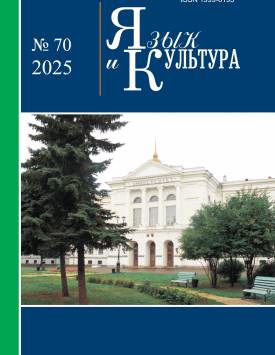Authentic digital corporate resources in the teaching of foreign language teaching of future engineers
The article is devoted to the specifics of the organization of foreign language teaching of future engineers in higher education using authentic digital corporate resources (ADRC). The inclusion of these resources in the teaching process is justified by the necessity to take into account the requirements to the set of competences of a modern engineer and the existing realities concerning, on the one hand, the digital skills necessary for a future engineering specialist in the conditions of digitalization of the sphere of his/her activity, on the other hand, the supraprofessional skills affecting the efficiency of professional activity of a future engineer. It becomes obvious that future engineers, who will have to solve new level tasks in new conditions, should possess competences corresponding to modern demands. At the same time, the rapid digitalization of production under the conditions of active development of digital economy reveals the deficit of competitive engineering personnel capable of adapting to the changing realities of the corresponding sphere of professional activity. Thus, modern needs regarding the set of competencies of future engineering personnel are reflected in a rather broad list of digital skills and abilities related to working with basic digital tools, automation and data analysis tools, mastering the basics of cybersecurity and digital document management, etc. The critical competencies of the future engineering workforce include the ability to work with basic digital tools, automation and data analysis tools, mastering the basics of cyber security and digital workflow, etc. On this basis, the critical competences of the engineer of the future, who will be in demand on the labor market, include digital competence, the presence of which is necessary due to the digitalization of production processes. Also an important component of the competence model of a specialist, as noted by many reputable business representatives in the field of design and engineering surveys, are communication and management skills that allow to interact effectively in teamwork mode and gain experience in project management, including remote projects. These skills are of particular importance, as different project tasks often require specialists with different competencies. Teams are created to solve such tasks. That is why, in the context of engineering education modernization, great importance is attached to communication and teamwork skills, skills of effective team management, including remote teams, which presuppose leadership qualities of future specialists. These skills are labeled as supraprofessional competencies in scientific and methodological literature and normative documents in the field of education. The presented research considers the linguodidactic properties of ADRC and the possibilities of integrating these resources into the discipline “Foreign Language” of engineering training directions in higher education. Based on the results of the linguistic and linguistic analysis of the corpus of texts of authentic digital corporate resources (websites, social media of companies and specialized events in the fields of engineering students' training), such linguistic and linguistic features of these resources characterizing their linguodidactic potential as the presence of texts with different genre and style organization within the framework of official and unofficial communication in the professional sphere, the presence of meaningful and meaningful linguistic and linguistic features of these resources are revealed. The research results allowed us to conclude that the integration of ADRC into the learning process contributes to more effective development of foreign language communicative competence in the professional sphere of future engineers and their su-praprofessional competences through the use and combination of different forms of ADRC-based learning organization (individual, independent, group, pair, microgroup, collaborative) and implementation of project, creative and research activities. The variety of used ADRCs, their focus on mass and round-the-clock access, different degree of depth and complexity of professionally significant topics, etc. increase the effectiveness of the organization of the learning process in the conditions of blended learning. The realization of the system of tasks developed on the basis of ADRC allows to develop in students both the skills of independent learning activity and the ability to work in a team, taking into account the interests and needs of students. The authors declare no conflicts of interests.
Keywords
foreign language teaching, linguodidactic potential of authentic digital corporate resources, German language, engineering training, technical universityAuthors
| Name | Organization | |
| Glumova Elena P. | Nizhny Novgorod State Linguistic University named after N.A. Dobrolyubov | el.glumova2010@yandex.ru |
| Zhigalev Boris A. | Nizhny Novgorod State Linguistic University named after N.A. Dobrolyubov | zhigalev@lunn.ru |
| Morozova Maya A. | Novosibirsk Military Institute of the Order of Zhukov named after Army General I.K. Yakovlev of the National Guard of the Russian Federation | majamorozova@mail.ru |
References

Authentic digital corporate resources in the teaching of foreign language teaching of future engineers | Yazyk i Kultura – Language and Culture. 2025. № 70. DOI: 10.17223/19996195/70/8
